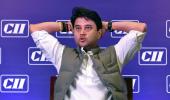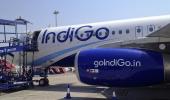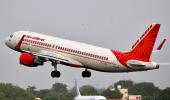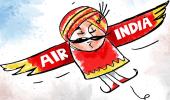It is not clear whether there are any safeguards in place to prevent any individual who may buy Gangwal’s entire stake from making a bid to gain control of the airline through an open offer.
Anjuli Bhargava reports.
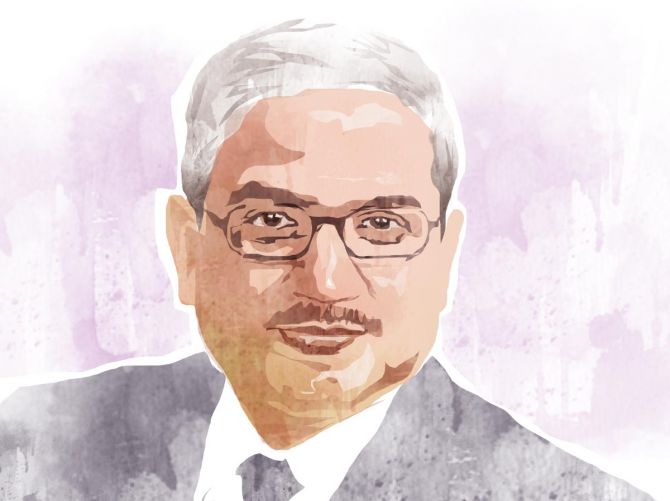
On February 19, India’s largest private low-fare airline IndiGo announced the resignation of one of the two founders, Rakesh Gangwal, from the airline’s board and his intentions of offloading his stake in the airline over the next five years.
The announcement came on a Friday, giving the stock markets the weekend to absorb the news but the markets registered a tepid response on Monday’s opening.
In contrast, in July 2019, when the fight between the two founders and erstwhile friends first became public, the markets reacted savagely.
The IndiGo scrip at the time fell 19 per cent, wiping out millions of rupees of shareholder wealth before bouncing back.
For readers who may be hazy on the details of the dispute, here is the context.
In June 2019, Gangwal publicly accused his partner and co-founder Rahul Bhatia of governance lapses and skimming the airline through related party transactions (RPTs) done between Bhatia’s other businesses and IndiGo.
Gangwal’s accusations were detailed in letters sent to the Securities and Exchange Board of India, finance ministry and other regulators.
Bhatia refuted all charges and countered that the allegations were just a ruse for Gangwal to control the company.
A lot of dirty linen was washed in public after which the partners went silent and took the battle to the London Court of International Arbitration. In August 2018, prior to publicly accusing his partner, Gangwal had withdrawn from active involvement in the company’s running and participated only in his capacity as a board member.
In some senses, his exit from the airline that he and his partner built from scratch marks the end of this bitter fight.
But as the dust of this fallout began to settle, company insiders, aviation industry experts and observers assessed the winners, losers and wider impact of the exit from the airline’s point of view.
While there are some aspects that seem clearer, a few vital questions remain unanswered.
In corporate battles of this nature, an exit usually means defeat, so to all those observing the developments from the outside, it would be easy to conclude that Bhatia won this battle fair and square.
Yet this is not as black and white as it may appear.
What seems clearer is that the allegations levelled by Gangwal against his long-time partner and friend failed to be fully proven.
This is not to say that there may have been minor lapses in the design and structure of the RPTs, the main bone of contention, but Gangwal’s claim that Bhatia was skimming the airline failed to stick.
But it’s not as if Gangwal lost the battle either.
From the very start of this unhappy saga, Gangwal reiterated the fact that he was never interested in controlling the company.
His supporters argue that if control had been his primary goal, he would not have been naive enough to have signed over control to his partner when both invested equally at the time of formation.
While the two founders had a good run from 2005, building the airline into the giant it is today, the trust broke between them in 2018 and Gangwal told many that he could not be involved in a company where he believes governance has been compromised.
Besides a few other changes, Gangwal wanted the articles of association of the company to be amended such that he would be free to sell his stake of 36.6 per cent — valued at Rs 29,895 crore on February 19 closing — with almost no strings attached.
His resignation and statement since has clarified that he proposes to sell his stake over the next five years as and when he pleases.
From a public point of view, many questions remain unanswered.
Technically it appears he is free to sell his entire stake to one individual or even to an airline if he so chooses, although not to a financial institution.
It is not clear whether there are any safeguards in place to prevent any individual who may buy Gangwal’s entire stake from making a bid to gain control of the airline through an open offer.
Industry experts, however, pointed out very few can shell out this kind of money and even fewer would do so since the control of the company with a 38.18 per cent stake remains firmly in Bhatia’s hands.
The airline declined to comment to an email with questions on the possible sale of shares and other matters sent to the airline founders.
What is also clear is that Gangwal’s exit is less of a loss today for the carrier than it might have been a decade ago.
In the airline’s early days, he used his knowledge and experience to steer, strategise, and to negotiate with aircraft manufacturers and helped fill key management positions and talent gaps through his vast network, convincing reluctant expats to relocate to Delhi.
Bhatia, who was relatively unfamiliar with the business back in 2005, no longer requires the same extent of handholding and has a strong management team to bank on.
With an over 50 per cent market share, IndiGo’s position is already pretty secure.
One must also bear in mind that Gangwal stopped taking an active interest in the airline’s running in 2018 so the airline has not benefited from his contributions for the past four years.
Bhatia and his team of senior management led by CEO Ronojoy Dutta have proved adept at steering the ship through the choppy Covid-19 waters.
Be that as it may, the airline now enters a new phase with Bhatia taking over as managing director, a position created for the first time.
This phase will also see IndiGo making a far more aggressive push into international territory, albeit with a narrow body fleet, at a time when Tata group is set to make its presence felt.
So in the final analysis, no matter which way one looks at it, company insiders and those outside of it argue that Gangwal’s exit with his over 30 years of experience of running airlines globally at this juncture can only be seen as a loss for India’s largest private airline.
To what extent remains a question for the new managing director and his team to answer in the coming years.


